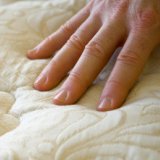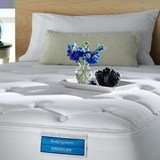Hypoallergenic Mattress Cover
Sounder Sleep for People with Allergies
For people with multiple allergies, a hypoallergenic mattress cover is indeed a must. Allergy mattress covers are actually a great idea for everyone, as they offer protection from allergens, bacteria, dust mites, and bed bugs.
In addition, they keep your mattress protected against the buildup of body fluids such as perspiration and urine. They also create a highly effective dust mite allergen barrier for your mattress. The best hypoallergenic mattress cover will protect you from upwards of 99.9% of dust mites and their associated allergens.
The Ideal Breeding Ground for Allergens
A hypoallergenic mattress cover will guard against a host of allergens which can cause moderate to severe reactions in those with multiple allergies. Pet dander, mold spores, dust mite detritus, and other microorganisms are all notorious for accumulating on mattresses; all can trigger strong reactions in allergen-sensitive individuals.
Washing one's bedding is important, of course, but not sufficient in itself to protect the serious allergy sufferer. Mattresses provide the ideal breeding ground for allergens, which settle deep inside the fabric and persist even with frequent washing of the bedding. The great thing about mattress covers is that they can be washed along with the bedding, preventing any allergen buildup whatsoever.
Innovations in fabric engineering techniques have made it possible to construct mattress covers that "breathe" and provide waterproofing benefits, while keeping the fabric quite comfortable to sleep on.
Traditional cotton mattress covers do not provide the same protection from allergens, because they are just as likely to become infested as the bedding and mattress themselves. Only genuinely hypoallergenic mattress covers offer the complete protection your family needs.
Popular Choices for Mattress Cover Materials
Some mattress covers are available in fabrics with a urethane or vinyl-based coating on their inside. Some people prefer urethane over vinyl because it is less likely to out-gas, creating odors to which allergic individuals tend to be highly sensitive.
This coating is entirely nonporous, making it impossible for dust mites and other pests to penetrate the cover. There seems to be widespread agreement that the best covers are the ones that zip entirely closed, and for obvious reasons: fitted mattress covers simply cannot provide the same level of protection as those that zip all the way shut.
Those who tend to perspire heavily in their sleep will appreciate membrane-free covers, because they create a smooth, cool surface on which to sleep. The lack of a urethane membrane makes these hypoallergenic mattress covers feel nearly the same as high-quality sheets; you're hardly aware the cover is present at all.
Those concerned with waterproofing their mattresses often go with one of the membrane fabrics, which are highly resistant to fluids and offer stain protection along with an effective allergen barrier.
If you wash your bedding very often and plan to do the same with your mattress cover, you may wish to choose a fabric higher in polyester than cotton to preserve its longevity. If softness is your primary concern, choose the opposite: a fabric high in cotton content and lower in polyester.
Bed Bugs: No Laughing Matter
There has been an upsurge in bed bug infestations lately, and people are wisely taking more precautions than usual when traveling to avoid coming into contact with these noxious pests. We all heard "Sleep tight; don't let the bed bugs bite" as children, and mostly thought of it as just an amusement.
These insects can in fact be a serious health hazard. Bed bugs are tiny parasites that burrow deep into bedding and mattresses, lay their eggs in the warmth provided by the fabric, and inflict bites that can cause anything from a mildly irritating itch to a life-threatening anaphylactic reaction. This makes the use of hypoallergenic mattress covers a good idea almost universally, even for those who do not suffer from allergies.
To prevent or control bed bug infestations, choose a cover made from a breathable fabric, never plastic. Plastic covers make mattresses "sweat," providing the perfect environment for mold and other bacteria that cause illness and support the life cycle of a bed bug population.
These insects require warmth and moisture to survive, so you want a mattress cover that prevents moisture of any kind from building up in the mattress. A tightly sealed cover with a zipper will trap any surviving bed bugs inside it; without a food source, they will die out within several months.
Let's All Sleep Better
Help us to spread the word!
Simply copy and paste this code into your Facebook page or blog. Thank you for sharing!



New! Comments
Share your thoughts about what you just read! Leave me a comment in the box below.